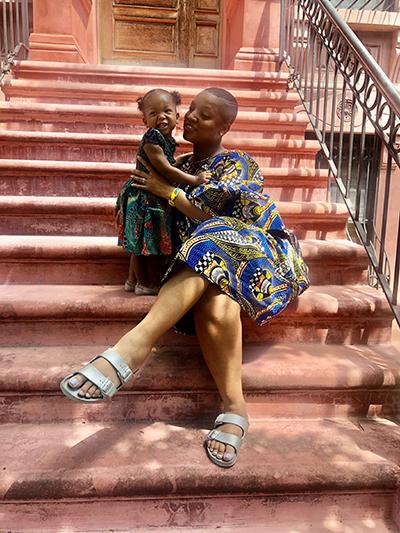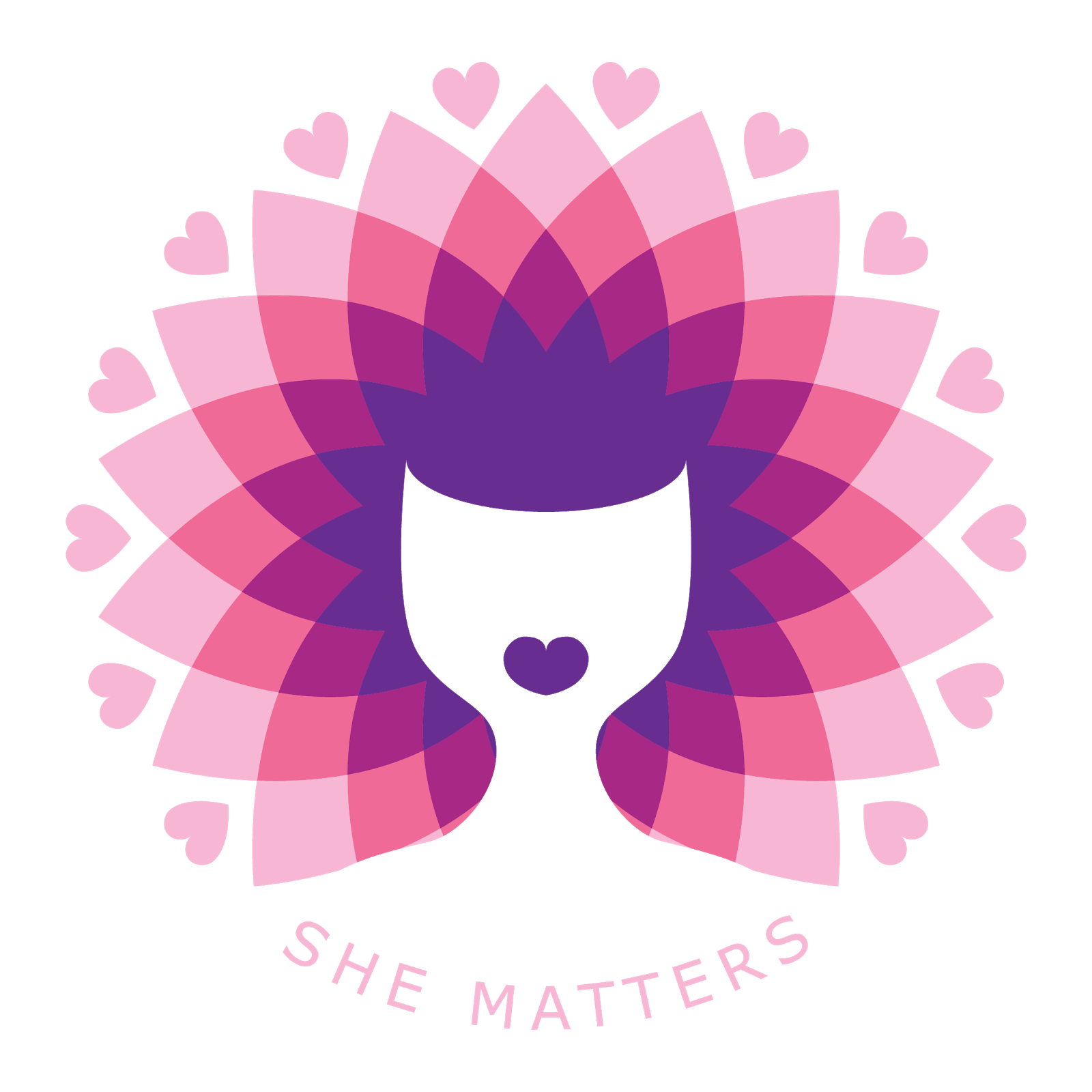
Source: SheMatters.io / She Matters.io
The physical pain of childbirth is a heavy ordeal and undertaking. But we’re warned about that. For many women, the emotional, psychological pain that follows is what caught them by surprise. And many Black women may find that they have to navigate this terrain with little to no help. That was the position Jade D. Kearney found herself in after the birth of her daughter. She recognized that something wasn’t right mentally. Eventually, she was able to pinpoint the fact that she was suffering from postpartum anxiety. But when she turned to her family for support, they were dismissive.
It was with that experience in mind that Kearney developed She Matters, dedicated to helping Black women deal with mental health issues.
Recently, we had a chance to speak with Kearney about her personal experience and the resource she was able to create for Black women as a result.
MadameNoire: Tell me about She Matters.
Jade D. Kearney: It’s an online/offline community for Black women who experience postpartum anxiety and depression.
MN: I know that you dealt with this personally can you tell me what were you experiencing that let you know that it was postpartum depression?
JDK: Well, I had postpartum anxiety which is a little bit different. As little as we know about postpartum depression, we [still] know more than we do about postpartum anxiety.
I had this longing to be very close to my daughter. Like most mothers, I didn’t want to be away from her. But what was happening was I was having all these thoughts. Like What if she drowns while I’m giving her a bath? What if I let go of the stroller when I’m near the street?
They were frightening, when I tell you…the thoughts that I was having. What if I harmed her?
And it was tearing me to pieces because that’s not at all how I felt. So I knew something was wrong because I started having these thoughts that were completely opposite of the way that I was feeling. You know how they talk about SIDS (Sudden Infant Death Syndrome) and I think that would make any mother anxious. But I wasn’t sleeping because I was checking her upwards of 200 times a night.
It was obsessive compulsive behavior.
MN: I had a cousin who was having similar thoughts. She called it depression. But the way you’re describing it, it seems like she may have had anxiety too.
JDK: What it actually is are intrusive thoughts. People who are not pregnant experience this. It’s under the umbrella of anxiety so it could be like a person who’s very shy has thoughts of going and blowing up a building. Like, they would never do it. 100 percent of the time, intrusive thoughts are not acted out on. It’s about the anxiety you have within. It’s your biggest fear. My biggest fear was something happening to my daughter. And it started to manifest in this like, What if I dropped her?
And I knew something was wrong when I was avoiding the kitchen when I was avoiding knives. I was like, What if I stabbed her?
It was all what ifs. So I started avoiding the kitchen.
MN: Would you say that your postpartum anxiety was affecting your parenting?
JDK: I think it was affecting my sanity. And if your sanity is affected, then your parenting is affected. I felt like I had a bond with my daughter but I felt a lot of guilt about what I was thinking. It was affecting my ability to be happy, which I think has a direct result on your child.
MN: At what point did you realize, this is something I need to get help for?
JDK: I realized it when I was three months postpartum. I was like, ‘I have to talk to somebody.’ I’m the oldest of eight so I tried to speak to my mom, first. And her immediate reaction was, ‘Yeah, I felt like that at different times. But I just dealt with it.’
My youngest brother, she said, ‘I didn’t even want to touch him or look at him when he was born but I already had four other kids so I had to do what I had to do. When I finally looked at him, he was six months and he looked like a different child.’ She said, ‘I used to feed him and turn my head.’
She said, ‘We’re Black, we don’t have the luxury of postpartum depression. You need to get up and do what you need to do.’
And that, to me, was devastating because I was suffering. And I really needed support.
So I went to my cousin, we’re only six days apart. At the time, she had three kids. This is my first. And her response was, ‘You’re so dramatic. You’re not having any postpartum, this is what being a first-time mother is like.’ And I was like, ‘Damn, it can’t be this bad. This can’t be normal.’ And she was like, ‘That’s because you waited so long to have a baby.’
And I was like now I’m being age shamed as a mother as well? Okay… (I was 33 when I had my daughter.) So I just remember feeling like one, I was complaining when I didn’t have the right. Two, I was acting white. I was the only person who had verbalized the suffering she had experienced in my family. And three, I felt like I’m going to feel like this forever. I’m never going to be back to my normal self.
MN: Did you have any difficulty in finding a mental health professional?
JDK: I didn’t have any difficulty in finding one, I had trouble finding one that I felt comfortable with. The first woman I went to, she asked, ‘Can I record you for my class?’ And older white woman. That threw me off because I was thinking, ‘I don’t want to be your Black pet project.’ When I would cry, she would cry. And she’d say, ‘I just feel bad that you feel so bad.’ I was like, wait a minute, you can’t be crying too.
She said, ‘I just want you to know so many other women experience this.’ I understood that but I’m not talking about them, I’m talking about me.
So I stopped going to her.
I always had anxiety and OCD but I didn’t know that that was called.
I saw Dr. Shenard, a middle aged Jewish man. I started going to him and I still see him today. Changed my life. We did exposure therapy. We did cognitive behavioral therapy. And what made me most comfortable in seeing him, was I told him, ‘I’m Black and that really has an effect on who I am as a person. So if you don’t understand the Black experience—as much as you can from a therapeutic lens, then I don’t want to work with you.’
And he was like, ‘I got it. I understand.’
Our relationship grew so much that he helped me with She Matters.

Source: SheMatters.io / She Matters.io
MN: How long after your work with your therapist did you think to launch the idea of She Matters?
JDK: So, I did therapy and I said, ‘If I was not better by one year, I would start meditation.’ And on my daughter’s first birthday, I was better but I was still ruminating. I knew I needed some type of help to take the edge off of what I was experiencing. And I have never taken any antidepressants. But one of my friends told me, ‘This isn’t just about your daughter. It has so much to do with what you’ve experienced.’
She broke it down and I said, ‘I got to get help.’ I went to a psychiatrist, a Nigerian American. She worked with me and I started taking medication.
The first time a doctor tried to give me medication, when I was six months postpartum, I went to my aunt’s house and she flushed it down the toilet.
MN: What?
JDK: Yes! So I’m still getting to your question. That’s when I knew there was a problem and that’s when I had the first Black women mental health brunch. It was ages 25-55 and women were breaking down in that room talking about the judgement that they received from so many women in their families. One woman said she kept telling her mom she needed help and she didn’t believe her until she checked herself into the psych ward.
I knew I had to do something at that point. So I started then. It ended up being my thesis project when I was NYU.
I just started interviewing Black women and so many had the same experiences that I had. The guilt in knowing you need something else. Or actually getting on a medication and not having any follow up. Do you know how many times Black women are prescribed a medication by their OBGYN and there is no follow up?
If you’re on an antidepressant, you should be working with a psychiatrist. I have been on an antidepressant for a year and five months and I have an appointment every month to check what’s going on with me, to see that it’s working.
And what happens is, a lot of Black women start, they don’t have the follow up care and they say, ‘It didn’t work for me. I didn’t like the way I felt.’ That’s because you need someone to be in a partnership. This is a journey.
And after you have kids, you’re always in a space of new. My daughter will only be one once. My daughter will always be three once. You’re always changing.
Just the lack of information, support- all of that made me say we have to do better for each other. We have to stop being silent. Silence is an enemy to getting better. Silence is an enemy to happiness and peace of mind.
And the more I shared, the more I had women tell me, I’ve experienced that too. I know that we are strong but to our detriment.
MN: And we should be allowed to be our full selves and sometimes that doesn’t always include strength.
JDK: Right and we have to be okay with speaking to one another and saying, ‘I really need you right now. I don’t feel like myself.’
MN: So tell us what She Matters offers.
JDK: It’s community, socially relevant resources, and culturally competent therapists.
Right now there is a premium model. When you sign up through email, the information and the list of therapists, all of that is free.
JDK: I want Black women to know that there is a place where they can go for help, where they can be their full selves. Where they can meet other women who’ve experienced what they’ve experienced and learn from them. I want us to feel safe. I want Black women who are experiencing postpartum anxiety and depression to feel safe through all of their emotions and their postpartum journey.
In addition to the traditional Western therapy, She Matters will also offer other forms of healing like acupuncture, Ayurvedic treatments, and massage therapists.
JDK: We want women to figure out what is your wellness equation? For me it looks like therapy, acupuncture, and medication right now. Getting to where I am now was not just Western medicine.
The She Matters app will be available for download in the first week of September. Visit SheMatters.io and sign up for the newsletter, to attend virtual events or to find a therapist. Let a Black woman know, she may be suffering in silence.









